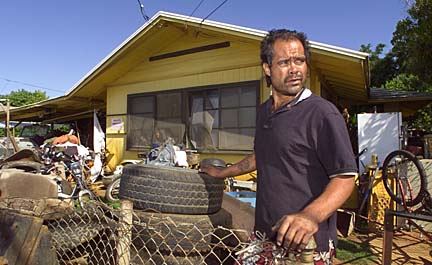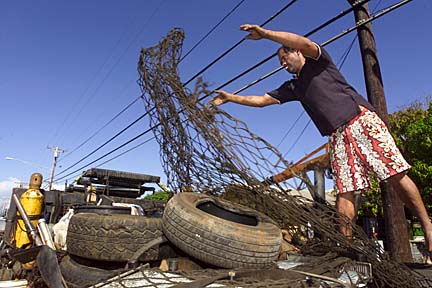

|
Kokua Line June Watanabe |
Action ongoing against
homeowner over junkQuestion: There is a residence on Fort Weaver Road whose yard is filled with junk -- tires, appliances, metal objects, trash, car parts -- you name it, it's there. They also have junk cars parked on the street in front of neighboring houses. This appears to be some sort of junk-collection business that has existed for many years. There are also all kinds of questionable activity on the street in front of the house in the wee morning hours. The owner of this mess was cited by the city awhile ago and most recently given a couple of months to clean up or face eviction. How is this operation allowed to continue?
The city has cited Keith Palmeira for running his scrap metal and recycling business from his Fort Weaver Road home in Ewa Beach. Palmeira may also be facing foreclosure from First Hawaiian Bank as a result of the junk-filled yard.
Answer: The property at 91-585 Fort Weaver Road apparently is notorious in your community and well known by city housing inspectors, who have cited the owner numerous times for storing car parts and scrap metal and conducting a recycling business in a residential district.The first citation was issued in 2000.
Keith Palmeira, one of the property owners, told Kokua Line last week he was not running a business, "just trying to survive" by selling scrap and other materials after he lost his job. But he has begun cleaning up the property in the face of thousands of dollars in fines, accruing daily, which the city has threatened to increase substantially.
When we visited the home on Wednesday, Palmeira pointed out how he was getting rid of stacks of tires and attempting to have cars parked in front of the house removed.
A city inspector showed up and told Palmeira that the city wouldn't be satisfied until all the car parts and scrap metal were removed.
At this point, however, Palmeira may be facing an even bigger threat -- foreclosure from First Hawaiian Bank, largely stemming from fines the city attached to his real property tax last year.
As to why the allegedly illegal operations have been able to continue for nearly four years, the problem, apparently, is that the city doesn't have the legal clout to do anything, at least initially, except issue citations and levy civil fines.
As one official explained, the city does not have the authority to go in and "lock up the building," despite the violations continuing for years.
Palmeira has begun cleaning up the property in the face of thousands of dollars in fines, which the city has threatened to increase. On Wednesday, he collected tires and put them onto his truck so he could haul them away.
The case recently was referred to the city Prosecutor's Office for possible criminal charges. But even then, the charges would be petty misdemeanors.The Prosecutor's Office said it couldn't confirm or deny that it was looking into a specific case.
"I can only say that I am actively reviewing cases" from the city Department of Planning and Permitting, on possible charges of nonconformance with city zoning ordinances, said Kevin Teruya, a deputy prosecutor. Until someone is charged, everything is considered confidential, he said.
Police are aware of the property and "have responded to a wide range of complaints in the past," said Michelle Yu, spokeswoman for the Honolulu Police Department. She declined to go into specifics, saying "the cases are still open."
Asked about the police investigations, Palmeira said he knows neighbors have accused him of all sorts of illicit activities, including drug dealing. To that, he said, "I disagree with it."
Use of the property "has been the source of numerous complaints by members of the community," including the neighborhood board, a state senator, a City Council member, the mayor and the managing director, said John "Mike" Friedel, of the Department of Planning and Permitting's Compliance Code Section.
Palmeira, who was taking responsibility for cleaning up the property, said he co-owned it with his late father, Thomas, who died in March 2003. However, Friedel said the citations were made out to another Thomas Palmeira, said to be Keith's brother.
A check of the city's real property tax records list the owners as Thomas Palmeira and Keith Palmeira.
According to Friedel, Palmeira "completely ignored" warnings from the city to stop the scrap metal activities and instead "intensified the use. Today, four years after the initial citations were issued, the illegal use is ongoing and the civil fines continue to accrue."
The first citation was issued in September 2000. The initial fine of $50 was paid and the violation "corrected fairly quickly," Friedel said. However, about two months later, the alleged illegal activities began again, he said.
Over the past 3 1/2 years, the property owner "accelerated and intensified the prohibited uses at the expense of the community," Friedel said.
Last year, the city attached $46,200 in fines to Palmeira's real property tax, hoping that would force compliance.
When real property taxes are delinquent for three years, the state Department of Taxation may initiate foreclosure action, Friedel said.
In this case, First Hawaiian Bank, reportedly to protect its interests, paid off the $46,200 in fines last October. The issue of repayment is now between the bank and Palmeira.
However, the city has continued to slap new fines of $50 a day on the property. Since Oct. 10, when the accumulated fines were paid off by the bank, the new fines total roughly $11,000, Friedel said.
"The fines will continue to be assessed until the violations are corrected," he said.
In the meantime, the Department of Planning and Permitting, in a letter dated May 11, threatened to raise the fines to $1,000 a day if the violations weren't corrected by the end of this month.
Palmeira appeared to be overwhelmed not only by escalating actions taken by the city, but by demands of payment from First Hawaiian Bank.
He said he never was told, until recently, that the bank had paid off the fine and asked how it could legally do that.
He said the bank threatened foreclosure earlier this year, but he managed to scrape together enough money to stave off that action. However, in April, the bank increased his mortgage payment to $14,172 a month, through September, he said.
Unemployed and "barely getting by," he asked, "How can I pay that?"
Gerry Keir, spokesman for First Hawaiian Bank, said he could not comment specifically on any customer account for privacy reasons.
But "the last thing any bank wants to do is foreclose on anybody," Keir said. "It's not a choice we make lightly."
|
See the Columnists section for some past articles.
Got a question or complaint?
Call 529-4773, fax 529-4750, or write to Kokua Line,
Honolulu Star-Bulletin, 500 Ala Moana Blvd., No. 7-210,
Honolulu 96813. As many as possible will be answered.
E-mail to kokualine@starbulletin.com

